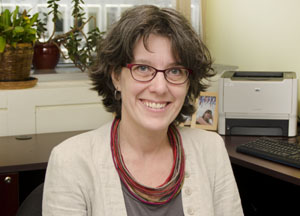
Breadcrumb
- News and Events
- News
- Content
- Interview with Dr. Isabel Fortier
null Interview with Dr. Isabel Fortier
|
FACE TO FACE with Dr. Isabel Fortier, an epidemiologist who gives research data a second life - Assistant professor, Department of Medicine, Faculty of Medicine, McGill University |
 |
|
How did you come to study epidemiology? Dr. Isabel Fortier: When I was little, I was fascinated by the way the human body works. Later I decided to study biology to find out more about it, and I went into epidemiology for my doctorate. I wanted to understand why some people remain healthy while others get sick, and most of all, to find out how we can prevent health threats like cancer or mental health problems from developing. Your focus has been on managing and harmonizing data with the Maelstrom Research project in recent years. Why did you go this route? I.F.: Very early in my research career, I realized it’s essential to work with high quality data if you want to advance knowledge of any kind. Also, it’s often essential to work with a large data sample, that is, number of participants. That often means combining data collected by different researchers. But the data collected vary from one place to another, so if we want to compare or combine data, we have to harmonize them first, make them comparable! That’s what led me to create Maelstrom Research. I wanted to develop a means of promoting the use of available data and facilitate collaborations among researchers. Can you explain more about the project? I.F.: It’s hard to get effective data management systems in place. Researchers don’t always have the specialized training it takes. Our mission is to develop rigorous methods and accessible software to permit researchers to manage their data and share it when needed. Our software is free and accessible to all, and we want it to stay that way! Over 20 projects worldwide use our software. Some already share data collected from thousands of subjects, while others are smaller in scale. Another goal of Maelstrom is to develop a catalogue of population studies. This catalogue gives access to detailed information on study mandates, documenting the types of information (or variables) collected to date, including by whom, how and where. So far the catalogue contains 160 studies and 600,000 variables. These tools permit researchers to identify studies that could help them answer certain research questions and offer good prospects for collaboration. What obstacles have you encountered? I.F.: Some researchers aren’t ready to share their data and methodological tools. But so far, we’ve been very lucky. What we’re doing gives a second life to research data, and more and more researchers are using our methods and software. In fact, we’re a bit victimized by our success. The demand for our support is so high that we lack the financial resources and personnel to respond to it. That’s our great challenge at present. With a team of over twenty in your laboratory, how do you organize the Maelstrom project workflow? I.F.: Vincent Ferretti [of the Ontario Institute for Cancer Research] and I are responsible for the project. Vincent takes care of software development and I take care of the scientific end. The team has five groups. One is in informatics, and develops software, websites and data infrastructure. Another is responsible for cataloguing studies. Four members work fulltime classifying thousands of variables, an enormous task. Each research assistant must classify almost 1,000 variables per day! There’s also a harmonisation team. It transforms study data into a common format, where possible, so that they may be combined. And finally, a team of statisticians and epidemiologists analyse the data and work on research publications. I imagine that this work leads to a lot of travel! How do you coordinate work and family when that happens? I.F.: True, it means plenty of travel. In under three months I once had five return trips from Montreal to Europe, and it’s hard to manage the time lag. Fortunately, my children are now adults. Fortunately, too, I’ve recently recruited young researchers who are very capable and can take over. It’s a great relief. What’s in store for you, personally, in the next years? I.F.: Maelstrom may be my “baby,” but my role is almost more of a manager now than researcher, and I’d like to take on some new challenges before I retire. I’d like to reach out to the younger generation and let them bring new ideas in, new avenues for research and development.
─ March 2017 |